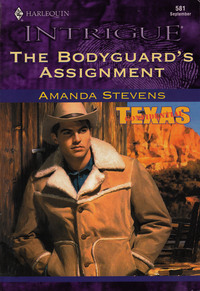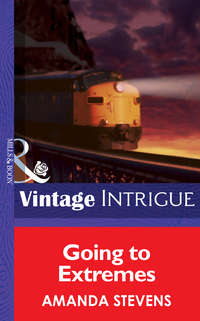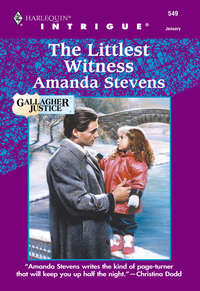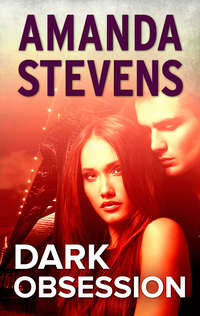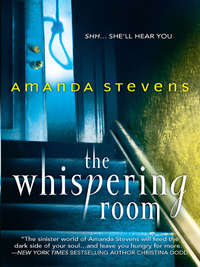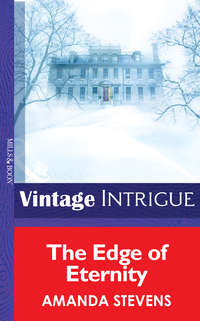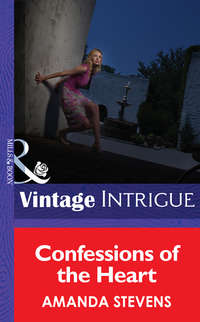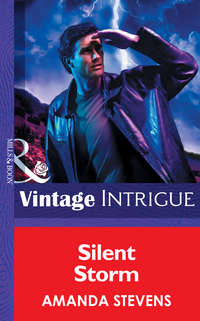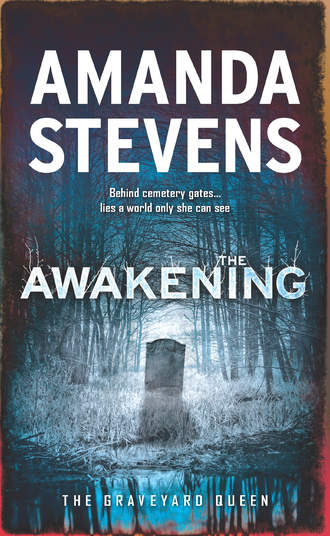
Полная версия
The Awakening
The driver left the car and came up the walkway, pausing with his hand on the gate as he tilted his head to stare up at the second-story windows. His behavior troubled me. I had the notion he was trying to determine whether or not the upstairs tenant was home. Another moment passed and then he opened the gate and stepped into the garden.
The night had gone deathly still. Even the songbird fell silent. Oddly, the scent of the gardenias deepened, as if Jonathan Devlin’s arrival had somehow stirred the heavenly scent. The driver’s footsteps were muffled as he strode up the walkway and climbed the porch steps.
I didn’t move a muscle as I tracked him. If he peered into the shadowy corner, he would spot me huddled and quivering, but he didn’t even look my way. Instead he paused on the top step as Angus barked a warning from inside. Then he turned to glance over his shoulder at the car.
“You hear that?” he called softly.
“You mean the dog? Yes, come away from the porch before the whole neighborhood is awakened,” Jonathan Devlin said gruffly. “We’ll wait until morning.”
The driver immediately turned and exited the premises as quickly and as quietly as he had come.
I cowered in my hiding place as my heartbeat thundered in my ears. Only when the sound of the car faded did I rise and clamor down the porch steps, rushing along the walkway, through the gate and out to the street. I even took a few steps toward those receding taillights before I came to my senses and halted. What was I doing?
If Dr. Shaw’s research and conjecture proved correct, then the elderly Devlin was not only a member of the Congé, but perhaps the leader. He could be every bit as dangerous as Claire Bellefontaine, perhaps even more so.
Why else would he have come to my house? Why now, if not on a mission for that dastardly faction?
Nine
Once inside the house, I calmed Angus as I locked the door, reset the alarm and then stood at the window for several minutes watching the street, my breath catching at the sound of every car engine. I didn’t see the black car again but I could imagine the sleek lines gliding through darkened alleyways back to the exclusive enclave south of Broad, back to that towering mansion on Battery Row.
Letting the curtain fall back into place, I knelt to stroke Angus’s back and scratch behind his battered ear nubs. Now that the outside threat had passed, he relaxed and pushed up against me. Since our time in Seven Gates Cemetery, we’d returned to our old friendship and I welcomed the ease and affection with which he now greeted me.
“I’m glad to see you, too,” I murmured, dropping all the way to the floor so that he could nuzzle my face. “You’ve no idea.”
After a few minutes in his calming company, I began to think a little more rationally. I even managed to consider the possibility that I had overreacted. The unexpected visit from Jonathan Devlin had thrown me for a loop, but if he were up to no good, would he have had his driver park in front of my house? Would he have sent the man up to my door? He was far too smart and seasoned to leave that kind of trail. No, whatever his motive, he hadn’t come here on business for the Congé. So why had he come?
My nerves still thrummed as I headed down the hallway to the kitchen, Angus at my heels. I put on the kettle and fixed a cup of chamomile before letting him out in the rear garden for his evening activities. I sat on the back steps and sipped the soothing brew as he made his rounds through the bushes and flower beds, sniffing here, pawing there before disappearing into the shadows to do his business.
The night was still clear, but the wind had risen since I got home, and I snuggled my sweater around me as I listened to the tinkle of the wind chime. The discordant notes were a comfort because they didn’t settle into a melody. I hoped that meant the ghost child hadn’t followed me home from the restaurant.
Even so, I remained jittery, my disquiet too easily summoning the images that had unfolded in that garden. I shuddered as I thought back on that horrifying tableau. Someone had killed that child. Murdered her in cold blood. I wondered about her assailant, why he had remained invisible to me. Was he—she—still alive? Had he gone unpunished all this time?
As I sat there puzzling over the child’s death, bits and pieces of last night’s dream mingled with the ghost’s revelations. In the back of my mind, I could see Mama and Aunt Lynrose at the edge of that open grave, rocking and sipping sweet tea as my aunt warned me not to poke my nose in places it didn’t belong.
Leave her be, Lyn. We should have tended to this business years ago. Now it’s up to Amelia to uncover the truth.
What business? What truth? How could that child’s murder be connected in any way to my family?
It couldn’t, I told myself firmly. Sometimes a dream could portend the future or unlock the past, but sometimes a dream was just a dream. It was pointless to try and infer anything from those disjointed images when I had concrete clues to decipher.
The prospect of another investigation so soon after my harrowing experiences in Seven Gates Cemetery overwhelmed and exhausted me. What choice did I have, though? The ghost had already latched on to me and she wouldn’t fade away of her own accord. I had learned that the hard way. Her tricks would only become more pernicious if I tried to ignore her. The sooner I started putting the pieces together, the sooner she would go back to her grave and we could both rest easy. That was the hope, at least.
Succumbing to my weariness, I yawned and called to Angus. He appeared at the edge of the shadows, head cocked as he regarded me across the garden. When I called to him again, he took a step toward me and then halted, his tail going up as he fixed his gaze on the steps beside me.
“What is it?” I murmured even as a thrill skirted along my spine. I turned to stare at the empty space beside me. There was no ghostly chill, no shimmer from a manifestation, only a quivering certainty that I was no longer alone.
“John,” I whispered. It wasn’t a question. I knew he was there just as I knew if I put out my hand, I would feel nothing but air.
The night became unbearably still, so quiet I could hear the sigh of the wind in the trees. Or was that my own sigh? I swallowed and touched my face where I could have sworn I felt his lips.
A moment later, the wind chime tinkled as if brushed by an invisible shoulder. I heard the gate creak as if a flesh-and-blood entity had gone through it.
Then all was silent in my garden.
* * *
I had another strange dream that night. I was a child again, no more than nine or ten, wandering through the familiar terrain of an abandoned cemetery. The air smelled of old death and fresh earth, a scent that I did not find unpleasant. As I walked on, the breeze picked up, swirling the mist at my feet as the leaves overhead started to whisper my name. Amelia. Amelia.
I wasn’t at all frightened of those whispers or of my withered surroundings. I was at home here. The eerie sights and sounds were a comfort.
On either side of me, angels with broken wings rose up out of the mist and I wanted to stop and read the epitaphs as I had always done with Papa. But the plates on the monuments were blank, as if the inscriptions had somehow been scrubbed clean.
A memorial without a name seemed very sad to me. I didn’t like the notion of the dead being hidden away and forgotten. Everyone had the right to be mourned and remembered, even those who had dwelled on the fringes of someone else’s life.
I walked on, the paving stones cool beneath my bare feet. The shadows grew longer and a tingle up my spine warned of the coming twilight. But I didn’t turn back. Something awaited me in the cemetery, something important. Something I needed to see. A part of me knew that I was dreaming, but it was more than a dream. Deep in my subconscious, memories were stirring.
Eventually, I came upon Mama and Aunt Lynrose still rocking beside that open grave as they sipped sweet tea from frosted glasses. They were dressed in cool linen, hair precisely coiffed, makeup and nails done to tasteful perfection. I caught the whiff of lemon sachet on the breeze and more faintly, the green notes from their perfume.
The familiarity of those fragrances wrapped me in the warmest embrace and I hurried forward, eager to be drawn into their circle. They whispered to one another, their expressions anxious and didn’t even glance up as I approached. I went right up to the fence and called out to them through the wrought-iron gate, but they didn’t seem to hear me and for whatever reason, I couldn’t enter. The gate was locked tight.
I sank down in the mist and closed my eyes, letting their voices drift over me. I heard my name now and then, but mostly they were reminiscing about their girlhood days. The murmur of their soft drawls and clinking glasses aroused a dreamy nostalgia. I hugged my knees to my chest as I thought back on all those overheard conversations, all those sisterly secrets that intrigued and mystified even as they deepened my loneliness.
Mama said with a little sigh, “Lyn, do you know what I’ve been thinking about lately? That dress Mother made for your sixteenth birthday. The midnight blue one.”
Aunt Lynrose clutched her hands to her heart. Her voice grew soft and unbearably wistful in the twilight. “Oh, how I loved that dress! I wore it to the spring dance, remember? The crystals on the skirt twinkled like starlight when I twirled.”
“You wore your hair up that night and Mother let you borrow her diamond earbobs. You looked just like a princess.”
“And I felt like one, too.”
“I remember how happy you were when you left the house. How you couldn’t stop smiling.”
“It was a night like no other.”
“If only we’d known—”
“Don’t, Etta.”
“When you didn’t come home—”
“Oh, don’t let’s talk about that part,” my aunt pleaded. “I just want to remember the music and the moonlight and the scent of honeysuckle drifting in through the open doors.”
“But we have to talk about that part,” Mama insisted. “That’s why we’re here. When midnight struck and you didn’t come home or even call, Mother was beside herself with worry. It wasn’t like you to miss curfew. And Father—” Mama shuddered. “I’d never seen him so angry. He paced the floor all night and when you finally came home at sunrise, you had that terrible row.”
“You don’t need to remind me.” My aunt’s voice sounded resigned as she lifted a hand to her cheek. “I’ll remember every word he said to me until my dying day.”
“Nothing was ever the same,” Mama said sadly. “We were a happy family until that night. At least it was easy to pretend that we were. Then Father sent you away and I wanted desperately to come with you. The tension in the house had become so oppressive by that time. But I suppose I had it easy considering what you had to put up with Aunt Rue. She was such a spiteful person. So pious and judgmental. I don’t know how you stood it.”
“I stood it because I had to. It was my penitence, Father said.”
“It was cruel of him, what he made you do.”
“And I’ve never forgiven him,” my aunt said. “But what good does it do to dredge all that up now? Haven’t we both learned that some secrets are best left buried?”
“Have you been able to bury it, though?”
“Yes, until I hear that song. You know the one I mean. And then everything comes back as though it were yesterday. All that pain and suffering. The guilt and the loneliness. Oh, Etta, the loneliness...”
The faint tinkle of a wind chime came to me as I knelt there clinging to the fence. The melody drifted through my senses, tugging at more memories until I had the strongest sense of déjà vu. I knew that I had overheard this very conversation just as I knew the secret my mother and aunt spoke of wasn’t meant for my ears. I would be in trouble if they caught me eavesdropping and I couldn’t abide Mama’s disapproval. She and Papa were everything to me, so I tried very hard to never, ever displease them. I stood to alert her of my nearness, but when I called out to her, she dissolved into the mist without even acknowledging my presence.
“Where did she go?” I cried. “I need her to see me.”
My aunt stared pensively into the open grave. “Leave it alone, chile. You can’t change the past. What’s done is done. You of all people should know that no good ever comes from all that digging.”
And then my aunt vanished, too, leaving me with a terrible foreboding. What’s done is done.
I knew that I was still dreaming, but the realization gave me no comfort because I couldn’t rouse myself. Not yet. The dreams and the ghostly visits were somehow connected and everything had meaning. The mist, the open grave, my mother and aunt’s conversation. Even the beady eyes of the corpse bird that watched me from atop a headstone. If the crow wasn’t a clue, then it was surely a sign or an omen. It means someone else is likely to pass.
I pulled myself up to my full height, shaking off those lonely bondages of my childhood so that I could continue the journey as an adult. As I moved back into the cemetery, I realized the scene had shifted and now I found myself behind the crumbling walls of Oak Grove Cemetery, that darkest of all burial places, where even the dead didn’t wish to linger.
The mist thickened and the air grew colder. An unnatural wind tore at my hair and the hem of my nightgown. I covered my nose and mouth as the smell of fresh death rose up from a sea of open graves.
Straight ahead, the Gothic spires of the Bedford Mausoleum peeked up over the treetops. The distant tinkle of a wind chime lured me into the woods and when I emerged into a clearing, I found myself at the bottom of a long staircase. At the very top, light shone through an open doorway where shadows danced upon the walls.
I didn’t want to go up there. I didn’t want to see inside the mausoleum. But the melody of the wind chime wrapped around my senses, drawing me upward as if a string around my wrist had been tugged.
The air grew steadily colder as I climbed. The night became crowded with ghosts. The diaphanous beings drifted up behind me on the steps, brushing their frigid fingers through my hair, pressing icy lips to my ears as they whispered about unspeakable secrets.
I could feel my energy wane as their appetites threatened to consume me. But I kept climbing, on and on until I reached the summit. A silhouette appeared in the doorway blocking my way into the mausoleum. It was Devlin, barefoot and shirtless, his hair unkempt, his eyes inflamed with an emotion I didn’t want to name.
I put out a hand, thinking he would dissolve the way Mama and Aunt Lynrose had, but instead I felt the warm ripple of muscle. I closed my eyes on a shiver.
He caught my wrist and I thought he meant to pull me against him. I wouldn’t have resisted no matter his betrothal. But he held me away, the intensity of his stare deepening my unease until I suddenly found myself wanting to break free of him.
“You shouldn’t have come here,” he said harshly, holding me fast. “You don’t belong.”
“Where are we?” I tried to look around him into the mausoleum but he stepped in front of me, shielding my view with his body. I could hear all manner of sounds inside, inhuman screams and groans that chilled me to the bone. “What is this place?”
“Go,” he said. “Before they find you.”
“Who?”
“You can’t be seen here. This is a place for the dead.”
“Then why are you here?”
He said nothing to that, merely stared at me longingly before he turned in resignation to go back inside. I stepped across the threshold into that cold, dark space filled with shadows and torchlight and noises that lifted the hair at my nape. But Devlin was nowhere to be seen.
I wasn’t alone, however. Claire Bellefontaine crouched on the stone floor before a pool of blood. Light shimmered in her silvery gold hair and something dark and feral glinted in her blue eyes.
She lifted a finger to her ruby lips. “Shush. Lest she awaken.”
Then she pointed to the doorway and I whirled. The ghost child hovered at the top of the stairs. She wore the same clothes as before, but now I could see a flash of silver in her fist.
Familiarity tugged at me again, but the memory flitted away as her face morphed into a corpse bird. I could see the iridescent sheen of her feathery hair and the dead gleam of those beady eyes in the torchlight. Her head hung at a sickening angle, but when I would have moved to help her, she emitted a high-pitched scream that knocked me back against the wall.
I crumpled to the floor, hands to my ears as I cried in horror, “Please stop. You’re hurting me.”
“Mercy,” she said before she tumbled backward down the stairs.
I rose and rushed to the doorway. She was already gone, but she’d left something behind on the top step. A charm bracelet gleamed in the torchlight, but when I bent to pick it up, my fingers found nothing but mist.
I awakened with my fingers tangled around the ribbon at my throat. The weight and purpose of Rose’s key should have reassured me, but my heart pounded so hard, I had to sit up in bed to catch my breath. I searched the shadows, all the darkened corners. Nothing was amiss. Angus snoozed on in a puddle of moonlight, oblivious to anything but his own dreams.
Shoving back the covers, I rose and padded into the hallway to check the alarm system. The activated light glowed reassuringly, but I still found myself glancing over my shoulder as I walked to the kitchen for a drink of water. Then I took a quick look around the house before returning to the front window to glance out at the street.
It was well after midnight and traffic had long since died away. The night was quiet and peaceful, lit by a crescent moon and the streetlights along Rutledge. I saw nothing untoward. Even the shadows were static. There was nothing inside or outside that should have kept my heart racing, and yet my uneasiness mounted the longer I stood at that window.
My scalp prickled a warning as I suddenly vectored in on the cause of my disquiet. Halfway down the block a sleek black sedan with darkly tinted windows was parked at the curb. The headlights were off, but I could see the silhouette of the driver behind the wheel. As if prompted by the fierceness of my concentration, he opened the door, briefly illuminating the interior of the car. He appeared to be alone. He got out and came around to recline against the front fender.
I could see him clearly underneath the streetlight. Even from this distance, there was no mistaking his identity. I’d seen him on my front porch only hours ago.
And there was no mistaking his intent. He had been sent to watch my house.
Ten
I managed a few more hours of sleep and arose early in a resolved if not entirely upbeat mood. A cool gray light seeped into the bedroom, but the warm edge of sunrise glowed just above the horizon. While I dressed, Angus roused and padded off down the hallway to wait patiently at the back door. After a quick look out the front window to make sure the black car had moved on, I turned off the security system and followed him outside.
Plopping down on the steps to tie my walking shoes, I let my thoughts amble while he went about his morning routine. Naturally, my mind went back to the dream and to Mama and Aunt Lynrose sitting beside that open grave in their rockers. Time and my subconscious may have embellished the dialogue, but I had no doubt I’d overheard a similar conversation sometime in the distant past. The memory had been pushed to the back of my mind until recent events had called it forth. But why? I still couldn’t imagine how my mother and aunt were connected to Woodbine Cemetery any more than I understood Devlin’s warning that I didn’t belong in the dead world. And he did?
The way he had turned away in resignation to walk back into the mausoleum had chilled me most of all, but maybe I was making too much of that scene. Not every element in a dream had to have meaning. Maybe some of the images were nothing more than fragmented memories and disjointed worries knitted together into something indecipherable.
I called Angus back inside and poured nuggets in his bowl. I topped off his water before heading out on my morning walk. The air was cool, but I set a brisk pace and soon warmed up from the exertion. Traffic was still sparse and I met only a handful of early-bird pedestrians. As I strode along the cracked sidewalks, I kept a vigilant eye, but if the black car tailed me, the driver was skilled enough to avoid detection.
Turning left on Broad Street, I sailed past banks and law offices housed in centuries-old buildings as I headed toward the water. The pastel houses along Rainbow Row glowed softly in the morning light. I crossed the street to the Battery, telling myself to keep moving, to avert my eyes when I passed the Devlin mansion, but that was asking too much. I slowed my steps as my gaze darted across East Bay. The sun was just rising over the harbor and the light reflecting off the windows blinded me.
Shielding my eyes, I scanned the elegant facade, searching the balcony where I had seen Devlin. He wasn’t outside today. No one was about. The family slept on while I stood watching their house.
Abruptly, I turned and made my way to the bottom of the peninsula, crossing the street once again to White Point Garden. No one was about in the park, either, and I was glad to have the space to myself. I followed a trail past the gazebo and canons to a remote spot where I often came to think.
The camellia blossoms hung heavy with dew, and the smell of brine drifted on the sea breeze, which ruffled my hair. It was one of those clean, clear mornings when Charleston shimmered like a diamond. I headed for my usual bench only to find it occupied. I started to move on, then stopped dead as a quiver went through me.
The man’s head was turned so that I could only see his profile, but I recognized the jawline, the rigid posture, the gleaming silver hair—not a strand out of place. Even at so early an hour, Jonathan Devlin was formally turned out in a three-piece suit and wingtips. A gold watch fob hung from his vest and a precisely folded pocket square adorned his coat. He could have been on his way to a funeral, so somber his attire.
I hadn’t made a sound. I was certain of that. But before I could make my escape, he turned and pinned me with a gaze every bit as dark and intense as his grandson’s. I was awestruck by that glare. It was as if his eyes had the power to hold me in suspended animation.
In that frozen moment, I suddenly became acutely aware of my own apparel—walking shoes, leggings and a faded hoodie. My hair was pulled back in a ponytail, but the wind and the exertion of my walk had loosened damp tendrils. I wore no makeup or perfume and my nails were clipped short so that I could more easily scrub away the graveyard dirt. A less appealing presentation I could hardly imagine, but why should I be so concerned about my appearance? Jonathan Devlin was nothing to me. I had no need to impress.
Even so, I couldn’t dispel the echo of my aunt Lynrose’s censure. You must always wear gloves when you work, Amelia. On that there can be no compromise. A woman’s hands never lie.
Neither of us spoke for the longest time, which only prolonged the awkward encounter. Finally, I cleared my throat and shrugged. “I’m sorry. I didn’t mean to disturb you.”
“It’s a public park. I don’t own this bench.” He had Devlin’s drawl, I noted. That cultured cadence rarely heard these days and only ever south of Broad Street.
I tried to suppress a shiver as I inched back a step. “That’s true, but you were here first. I can find another bench.”
“No, don’t run away, young lady.” His voice softened though not without effort, I wagered. He rose from the bench to face me.
He was tall, with the trim physique and resolute demeanor of a man who cut himself and those around him very little slack. I wondered what it must have been like for Devlin, a rebellious teen losing his parents so suddenly and forced to live with a man who wore a three-piece suit and polished wingtips for an early-morning stroll in the park. But then, I didn’t delude myself into thinking that this was a coincidental meeting. Not after the episode last night in front of my house.


